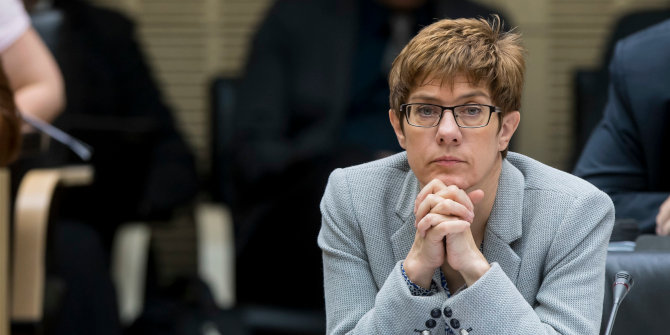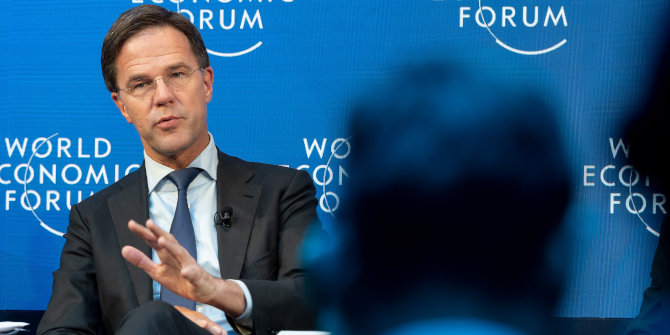 Annegret Kramp-Karrenbauer announced her resignation as leader of the Christian Democratic Union (CDU) on 10 February. Marcus Walsh-Führing writes the stage is now set for a contest over the future direction of the CDU, with those on the right of the party seeking a departure from the centrist approach pursued under Angela Merkel.
Annegret Kramp-Karrenbauer announced her resignation as leader of the Christian Democratic Union (CDU) on 10 February. Marcus Walsh-Führing writes the stage is now set for a contest over the future direction of the CDU, with those on the right of the party seeking a departure from the centrist approach pursued under Angela Merkel.
With her tenure as CDU party leader overshadowed by political miscalculations, Annegret Kramp-Karrenbauer (AKK) stepped down from her position on 10 February. This has placed Angela Merkel’s legacy and vision of the Christian Democratic Union (CDU) in jeopardy.
From the outset, AKK faced an uphill battle in defining her role as party leader as Merkel stayed on as Chancellor. Merkel’s presence limited AKK’s leadership role and has created confusion within the CDU regarding party leadership. The unwillingness of Merkel to step aside and allow AKK to take on the full responsibility of the party leadership has threatened the centrist approach of the CDU. This has given the CDU leadership less flexibility to bring in the left and right wings of the party. As a result, both wings of the party have been scapegoating Merkel’s centrist approach and her liberal stance on immigration policy for poor electoral results.

Annegret Kramp-Karrenbauer, Credit: © Bundesrat | Henning Schacht (CC BY-NC-SA 2.0)
Merkel’s legacy is partially based on pushing through her immigration agenda which has been heavily criticised by her party. To protect her legacy and the historical significance of the European immigration crisis, Merkel and AKK came to an understanding to maintain the status quo of Merkel’s immigration policy. However, during her tenure AKK expressed her own opinion on immigration policy by contradicting Merkel, which created conflict in the CDU. As AKK ultimately re-adopted Merkel’s centrist vision, their political strategy has been to isolate far-right political parties, such as the Alternative for Germany (AfD), by not participating in coalition-building during local and national elections when there would have been enough seats for the AfD to join the government.
However, in the recent elections in Thuringia, local CDU politicians defied the national party by joining a coalition with the AfD and the Free Democratic Party (FDP). These actions taken by local politicians demonstrated AKK’s lack of political authority in the CDU, especially in the conservative wing. This has been seen as a direct challenge by the conservative wing with the aim of regaining the CDU leadership. So, what does the future now hold for the CDU?
A more conservative direction
The question arises whether Merkel will be able to reunite the party after AKK’s departure. The latter is stepping down at a time when European leaders are looking to Berlin for leadership and the CDU has been losing its hold of the German electorate. During her time as party leader, AKK created a policy platform that favoured environmental and social issues over pro-business policies.
AKK’s pro-environmental and social policy agenda has created discontent in the CDU political ranks, forcing the party to redefine its political agenda. This has allowed the conservative factions in the CDU to challenge Merkel’s leadership role and her legacy in the party. It has also created a political vacuum that has the possibility to reframe the ideological stance of the CDU in Germany.
The CDU’s right wing wants its leadership to reassure its conservative members of the conservative values of the party. The post-Merkel direction of the CDU will depend on whether the traditional conservative or the centrist wings redefine the policy agenda for the party.
For the CDU to regain political influence, the party leadership will have to focus on coalition-building with political parties that satisfy members across the party spectrum. At the same time, the CDU needs to redefine and distinguish its message on immigration, defence, and fiscal policy to challenge the policy positions of the AfD and the Greens. This will allow the CDU to win back crucial votes that were lost in the last election.
While it seems that the conservative factions are regaining political clout in the CDU, there will be resistance from Merkel and others in the leadership to maintain their centrist approach. The CDU needs to mend its internal politics before crafting a way forward.
What next for the CDU?
AKK’s weakness has allowed CDU members such as Friedrich Merz, Health Minister Jens Spahn, the State Premier of North Rhine-Westphalia Armin Laschet, and the head of the CDU’s Bavarian sister party Markus Söder to once again become front-runners in the leadership race.
Merkel has demonstrated that she will play a key role in picking a new successor and protecting her legacy. Even if she hand-picks her successor, the new candidate will most likely negotiate an exit for Merkel earlier than her plan to leave office in 2021. This will be seen as a direct threat to Merkel’s power in the CDU by Merkel and her political allies.
To maintain unity in her cabinet, Merkel has asked AKK to stay on as Minister of Defence. For Merkel’s centrist approach to outlast the criticisms of the candidates in the upcoming election, a unified leadership is needed to challenge the opposition. The path forward for the CDU will involve the reframing of immigration policy to address concerns from the right wing while, at the same time, controlling far right extremism in German politics. As it stands now, the future of Merkel and the CDU is uncertain.
Please read our comments policy before commenting.
Note: This article gives the views of the author, not the position of EUROPP – European Politics and Policy or the London School of Economics.
_________________________________
 Marcus Walsh-Führing – Johns Hopkins School of Advanced International Studies (SAIS)
Marcus Walsh-Führing – Johns Hopkins School of Advanced International Studies (SAIS)
Marcus Walsh-Führing is a Postdoctoral Fellow at the Johns Hopkins School of Advanced International Studies (SAIS) Europe. His research interests focus on German politics, foreign policy, revenue collection, corporate governance, and regulatory autonomy. He has published numerous articles and reviews in: The Journal of Common Market Studies, Capital & Class, International Affairs, and International Studies Review.



